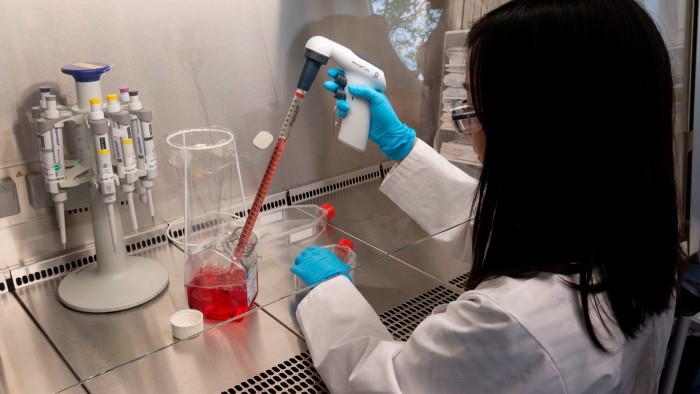Unlock the Editor’s Digest for free
Roula Khalaf, Editor of the FT, selects her favourite stories in this weekly newsletter.
Merck is nearing a roughly $10bn deal to buy lung disease-focused biotech Verona Pharma, the US drugmaker’s biggest acquisition in two years as it expands in respiratory medicine.
The acquisition of Verona would enhance the New Jersey-based pharmaceutical company’s pipeline with the addition of Ohtuvayre, a medicine approved in the US to treat chronic obstructive pulmonary disease (COPD), which analysts predict could generate peak annual sales of nearly $4bn by the mid-2030s. The drug is also in trials as a potential treatment for other lung conditions.
The acquisition, which would be Merck’s largest since its $10.8bn takeover of Prometheus Biosciences in 2023, is the latest example of a pharmaceutical group targeting a biotech with an approved product already generating revenue to fill the gap left by blockbuster drugs coming off patent.
Merck’s cancer treatment Keytruda, the world’s top-selling drug with nearly $30bn a year in revenue, is coming off patent and being hit by US government price-setting rules as soon as 2028. Shares in Merck, known as MSD outside North America, are down 35 per cent over the past year, giving it a market value of $203bn as of market close on Tuesday.
As part of the deal, Merck would pay $107 per American depository share for Verona, a 23 per cent premium to the biotech’s closing price on Tuesday, according to three people familiar with the matter. The takeover values the respiratory disease-focused biotech at about $10bn.
The talks between the companies were at an advanced stage and a deal could be announced as soon as Wednesday, provided there are no last-minute hitches, the people added. Merck declined to comment, while Verona did not immediately respond to a request for comment.
Verona’s Ohtuvayre, which launched in the US last year after being approved by the Food and Drug Administration for the treatment of COPD in adult patients last year, has got off to a winning start, with 25,000 prescriptions filled by the end of the first quarter, exceeding analysts’ expectations.
Merck’s acquisition would fast track the international launch of the drug in countries outside the US, the people added. It comes as Merck gears up for a blitz of product launches, with plans to roll out more medicines over the next five years than it has ever done in that timeframe in its history.
Ohtuvayre was the first completely new inhaled medicine approved as a maintenance treatment for the 8.6mn US patients with COPD, a leading cause of death that destroys lung tissue and function, in the past two decades. Unlike existing COPD drugs, it is not a steroid-based treatment and instead works by inhibiting two different enzymes, working to open up the airways and reduce inflammation.
Verona, a London-headquartered biotech founded in 2005, has also studied the same treatment in patients with a host of other lung conditions, including bronchiectasis, asthma and cystic fibrosis, as well as in combination with another COPD drug, potentially widening the reach of the drug in the years to come.
The acquisition of Verona would give Merck, best known as a cancer drugmaker, a stronger foothold in respiratory medicine after the US approval of Winrevair last year, a treatment for a potentially fatal disease affecting the lungs and heart, which it acquired in its $11.5bn buyout of Acceleron Pharma in 2021.
Since Merck’s chief executive Rob Davis arrived in April 2021, Merck has ranked as one of the most active pharmaceutical groups for acquisitions and licensing deals, as measured by number of deals done and dollars spent. But in recent months investors have clamoured for more deals to offset the looming sales decline from Keytruda’s patent cliff.
Meanwhile, the life sciences sector has been destabilised this year by the possibility of drug pricing reforms under President Donald Trump’s administration, the threat of tariffs and changes to regulatory and public health agencies under the leadership of top US health official Robert F Kennedy Jr, a known vaccine sceptic.
Merck’s problems have been compounded by a sales slowdown in China for its top-selling human papillomavirus vaccine Gardasil. Trump’s tariff policy prompted Merck in May to cut its 2025 sales outlook.
Davis has previously said he is hunting for deals of $1bn-$15bn in value, or even higher if the right target emerges. Earlier this year, Merck struck an up to $2.2bn licensing deal with China-based Jiangsu Hengrui Pharmaceuticals for the global rights to its heart disease drug.

